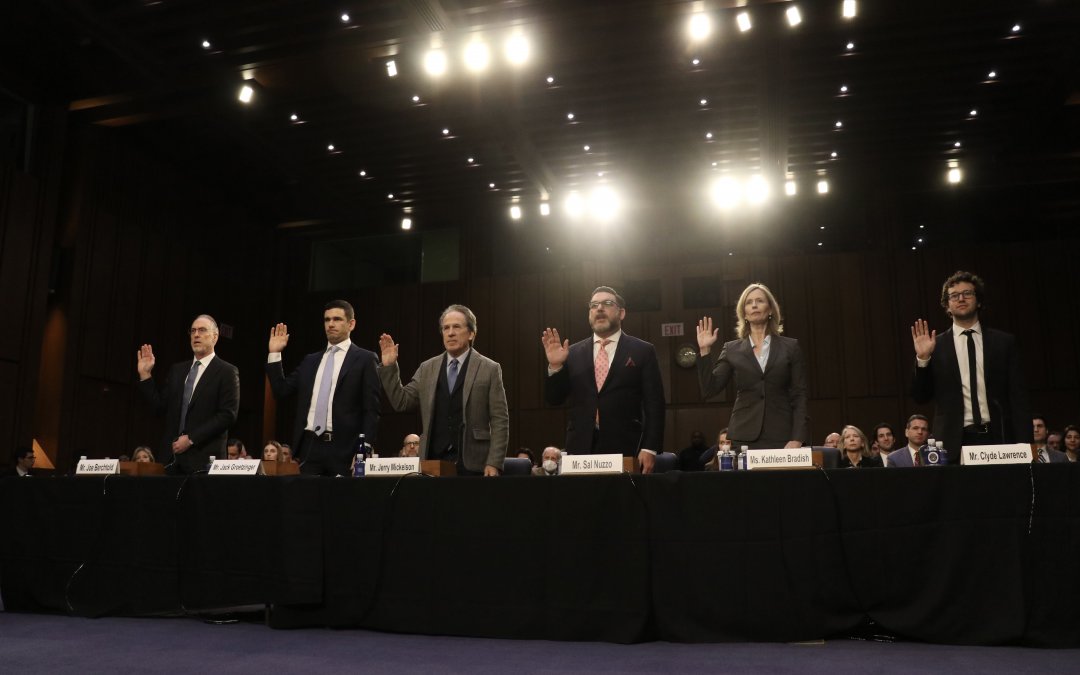WASHINGTON — Two months after Ticketmaster drew criticism for its flawed rollout of tickets for Taylor Swift’s upcoming tour, the ticketing giant is not yet out of the woods.
The Senate Judiciary Committee questioned the effect that Ticketmaster parent company Live Nation’s stronghold on the industry has on competition and consumer rights Tuesday in the first hearing of the 118th Congress.
In a rare show of bipartisan support, senators from both parties on the committee chastised Live Nation for its failure to protect the ticketing website from bot attacks and its use of high fees that can leave consumers paying significantly more than the listed price for tickets.
“You have brought together Republicans and Democrats in an absolutely unified cause,” Sen. Richard Blumenthal (D-Conn.) told Joe Berchtold, president and CFO of Live Nation Entertainment.
Sen. Amy Klobuchar (D-MN) and Sen. Mike Lee (R-Utah) announced in November their plans to probe the industry giant after millions of fans were unable to secure tickets to Swift’s tour. Ticketmaster said its system suffered delays due to “historically unprecedented demand,” receiving over 3.5 billion system requests that caused the site to crash for hours. Secondary ticketing platforms have listed some tickets for the Eras Tour for five-figure prices.
Swift, who did not appear at the hearing, came out against Ticketmaster in a statement following the debacle.
In her opening statement, Klobuchar, the chairwoman of the Subcommittee on Competition Policy, Antitrust and Consumer Rights, cited her love for music and the many icons, from Prince to Bob Dylan to Lizzo, that have come out of her home state of Minnesota.
“I believe in capitalism, and to have a strong capitalist system you have to have competition,” Klobuchar said. “You can’t have too much consolidation, something that unfortunately for this country, as an ode to Taylor Swift, I will say, we know all too well.”
Several senators from the committee pressed Berchtold on the Live Nation’s outsize industry control and whether it pressures venues to use its services – a claim he denied.
In his testimony, Berchtold recognized that Ticketmaster could have handled the sale better, but repeatedly attempted to shift blame to “industrial-scale ticket scalping.”
Throughout the hearing, the other witnesses – including the CEOs of Live Nation’s competitors SeatGeek and JAM Productions and antitrust experts from liberal and conservative think tanks – agreed with the senators’ claims that Live Nation’s behavior stifles competition in the industry.
After Sen. Ted Cruz (R-Texas) asked the witnesses if they view Ticketmaster as a monopoly, four witnesses said yes. Clyde Lawrence, a singer-songwriter from the band Lawrence who has criticized Live Nation’s practices, said he was unsure; Berchtold responded that “the ticketing business has never been more competitive.”
Senators implied that the Department of Justice “should’ve said no” to the 2010 merger of Live Nation, an event promoter, and Ticketmaster, a ticketing company.. Under the terms of the DOJ’s consent decree, Live Nation was barred from forcing the use of Ticketmaster’s services upon vendors. The DOJ extended this consent decree in 2019 after concluding that Live Nation had violated its merger agreement with its dominance of the industry.
Committee members didn’t shy away from referencing Swift’s lyrics throughout the hearing. Sen. Klobuchar said that consolidation in the ticketing industry is a problem known “all too well,” and Sen. Lee alluded to Swift’s recent pop hit “Anti-Hero,” by suggesting that Ticketmaster should “look in the mirror and say ‘I’m the problem, it’s me.’”
Senator Marsha Blackburn (R-Tenn.) – no friend of Swift’s despite their shared Tennessee roots – grilled Berchtold on Ticketmaster’s vulnerability to bots in an aggressive line of questions. She asked Berchtold why others in industries such as finance and health care have dealt with bot attacks, while Live Nation has not.
Berchtold pushed back on assertions that Live Nation controls 80% of concert venues in the U.S., as reported by a 2010 court filing. The executive said the real number is now in the 50-60% range and that “the U.S. ticketing markets have never been more competitive than they are today.”
In his testimony, Berchtold said that venues, rather than Ticketmaster itself, set service fees. But, Clyde Lawrence, a member of the band Lawrence who testified at the hearing, said in his experience venues claimed not to have jurisdiction over these additional fees.
David Balto, an antitrust lawyer, said that the case illustrates a failure of antitrust enforcement.
“This is a tale of how antitrust enforcement isn’t supposed to, did not work, and failed miserably,” Balto said. “I think having a strong position by people in the judiciary committee… will really strengthen the Department of Justice position.”
Legislative remedies floated during the hearing ranged from mandating that ticket-sellers display “all-in” pricing to making tickets non-transferable, a proposal highlighted by Sen.John Kennedy(R-La.) in his questioning. Berchtold implied that Live Nation would support legislation to promote transparency in the industry, but did not make specific promises.
“I think what we’ve heard does cry out for some response by Congress, but candidly, I’m not sure that the anti-trust laws are the best tool in our toolbox,” Sen. John Cornyn (R-Texas) said.
While Klobuchar said sparking stronger anti-trust legislation was one primary goal of the hearing, along with sharing information with the public and aiding DOJ investigations, it remains unclear whether Congress will take decisive action to strengthen oversight of the industry.
Regardless of what action Congress decides to take, though, it appears unlikely that Ticketmaster and Live Nation will be able to “shake it off” after sustaining a hit to their reputation.


